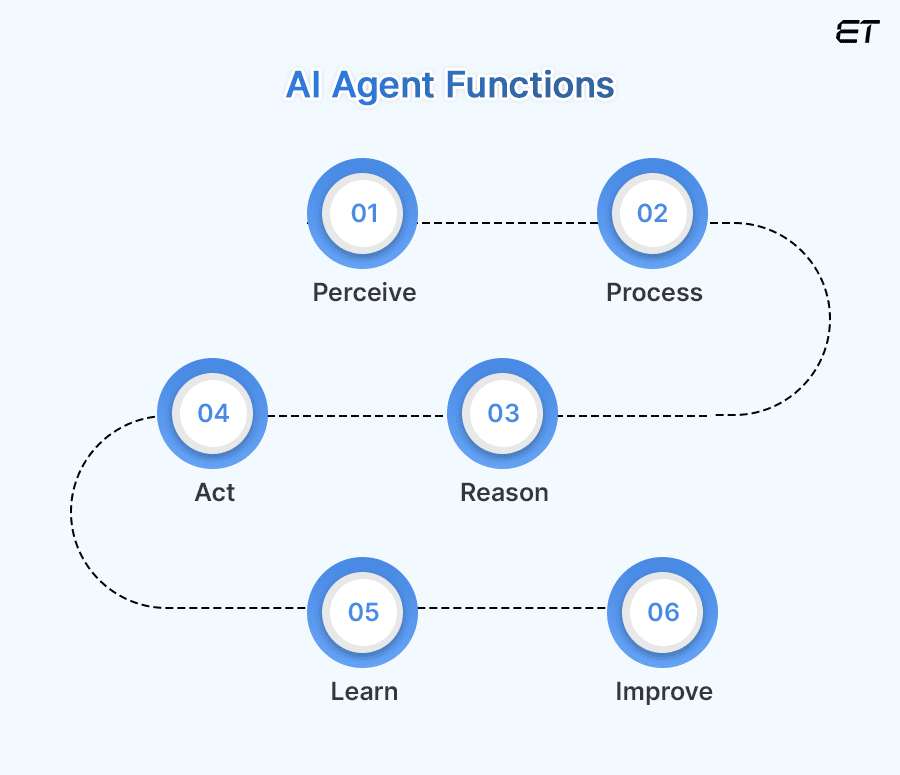Free Facts On Deciding On An AI Agent Website For Business
Free Facts On Deciding On An AI Agent Website For Business
Blog Article
Ai Agents Can Be Used By Businesses To Reduce The Mistakes That Are Made By Hand In Financial Operations.
Here are 10 helpful tips for businesses on how they can decrease the amount of errors in financial transactions by utilizing AI agents.
1. Automated Data Entry
AI eliminates data entry errors by:
Making use of OCR (Optical character recognition) and NLP, (Natural Language Processing) to extract information from receipts, financial documents and invoices.
By avoiding manual entry, data can be synced with financial software directly.
2. Smart Validation Rules
AI ensures data accuracy by:
Cross-referencing inputs to defined rules and data from the past.
Real-time error detection, such as duplicate entries, incorrect totals, or incorrect formats.
3. Real-time anomaly detection is a extremely effective tool
AI identifies discrepancies by:
It is important to monitor the financial transactions for any unusualities or patterns not in the norm.
Alerting users to potential errors or fraud before they escalate.
4. Standardize Financial Processes
AI is dependable because of:
Automate repetitive tasks, for example the generation of invoices, tax calculations and journal entries.
The reduction of the variability in manual processing among different teams.
5. Use Predictive Analytics
AI minimizes forecasting errors by:
Utilizing historical trends and current data to give accurate income, cash flow, or forecasts for expenses.
Identifying areas susceptible to inconsistencies, and suggesting the corrective action.
6. Automate Reconciliation Processes
AI enhances accuracy in reconciliation of accounts through:
Automatically synchronize transactions in the ledgers of bank accounts and invoices.
The ability to highlight items that aren't identical will allow you to pinpoint the issue faster.
7. Deploy Intelligent Approval Workflows
AI reduces human oversight errors by:
Sending financial approvals using guidelines that are preconfigured to the appropriate individuals.
Before moving a transaction into the workflow, be sure that it satisfies certain requirements.
8. Conduct regular data audits
AI simplifies audits by:
Continually monitor and validate financial records in order to make sure that they meet the requirements.
Reports that are audit-ready with the complete log of any changes and corrections.
9. Integrate AI with financial systems already in place
AI reduces integration errors by:
A seamless sync of data between ERP platforms as well as CRM systems and accounting platforms.
Beware of data silos, duplicate entries or other irregularities.
10. Make use of AI to the greatest potential by implementing efficient training
AI tools are most effective when their users are aware.
Help employees learn how to effectively utilize AI and AI-generated insight.
Encourage trust in AI for accuracy while overseeing critical decisions.
These strategies could help companies cut down on mistakes during manual procedures, increase the accuracy of their operations and free up resources for strategic financial activities. Follow the top rated AI agent for Password Expiry Notifications for website recommendations including AI agent for reconciliation, AI agent for customer management, AI agent for emAIl campAIgn personalization, AI agent for customer support, AI agent for ticket resolution, AI agent for insurance clAIms processing, AI agent for tax management, AI agent for risk assessment and mitigation, AI agent for transaction matching, AI agent for accounts receivable and more.
Ai Agents: 10 Ways To Integrate With Existing Systems Seamlessly
Here are 10 ways AI agents can seamlessly integrate with existing financial systems:
1. Automated data synchronization across systems
AI agents are able to be used to ensure data flows are fluid through:
Automatically synchronize data between CRMs, ERP systems, accounting and banking systems.
Reducing the need for manual data entry and ensuring uniformity across all platforms.
2. Real-Time processing of transactions
AI agents can enable real-time processing via:
Integration of payment gateways, banks, and financial platforms, to complete transactions quickly.
It's possible to update data across multiple systems in a matter of minutes, making sure that the information on financials is up-to-date.
3. Cross-System Reconciliation
AI agents are able to reconcile financial information between various systems using:
Automatically connecting transactions across accounting, ERP platforms, and payment platforms.
Recognizing discrepancies in the data and solving them without the need for manual input.
4. Unified Reporting and Dashboards
AI agents create unified report using:
A single dashboard that consolidates data from different financial systems.
Real-time and accurate financial insights and performance metrics that allow you to make better decisions.
5. Seamless API integrations
AI can be integrated into existing systems by using APIs.
Connecting AI agents to existing software tools with Application Programming Interfaces (APIs).
AI agents that seamlessly retrieve, process and send data between systems.
6. Workflow Automation across Platforms
AI agents can automate workflows:
Automating processes such as invoice making, approvals, payment and the integration of systems.
Improved efficiency and accuracy through the elimination of manual intervention.
7. Intelligent Document Management
AI can manage documents across different systems through:
Making use of Optical Character Recognition, Natural Language Processing, and other tools to collect, categorize, and analyze data from invoices.
Data can be uploaded automatically into systems (e.g. document management software, accounting software) for storage.
8. AI-Driven Customer Relationship Management
AI is able to be integrated with CRM systems:
To offer customized financial services or advice Financial systems are used to analyze customer data.
Automatically updating records of customers to reflect transaction history, payment behavior, and other insights from AI analysis.
9. Fraud Detection Across Financial Systems
AI enhances fraud detection by:
To spot irregularities, continually look over transaction data from the financial platforms that are integrated.
Informing all parties involved in real-time to possible fraudulent activities across systems.
10. Predictive Analytics Integration
AI integrates with financial forecasting tools by:
Cash flow, revenues and expenses are predicted using the data from sales and accounting systems.
To increase the accuracy of forecasting, add this data into your financial planning software.
Through leveraging AI agents to integrate seamlessly with financial systems already in place, businesses can enhance operational efficiency, improve accuracy, streamline workflows and make more data-driven choices faster and more effectively. Have a look at the expert AI agent for Help Desk Support for more info including AI agent for launch campAIgns, AI agent for vendor selection, AI agent for emAIl campAIgn personalization, AI agent for contract drafting, AI agent for ticket reopening monitoring, AI agent for service survey collection, AI agent for budgeting, AI agent for patent filing preparation, AI agent for payroll, AI agent for response time monitoring and more.
Ai Agents - 10 Ways They Can Assist Businesses In Reducing Costs
AI agents are able to lower the cost of financial operations through a variety of methods.
1. Automating Routine Tasks
AI agents are able to handle repetitive tasks.
Automating manual processes such as the processing of invoices, input of data and match of transactions frees up valuable employee time.
The reduction in the requirement for personnel for regular tasks, which results in lower operational cost.
2. Enhancing Accuracy by Reducing Errors
AI reduces the errors that are that humans make by:
Minimizing the possibility of mistakes made by humans in financial data like inaccurate calculations or errors in data entry, which can result in expensive corrections or fines.
Making sure that financial reports are accurate Invoicing, reconciliations and financial reports. This will reduce the cost of the need to rework, pay fines, or the need to rework.
3. Optimizing cash flow management
AI enhances cash flow through:
Predicting the cash flow gap and recommending the best times for payment or collection will allow you to avoid late fees and also miss out on discounts for early payment.
Analysing historical payment information to identify trends will improve your company's ability to plan and prepare for seasonal fluctuations.
4. Enhancing Expense Management
AI aids in managing and control costs by:
Automatically tracking, categorizing, analyzing expenses, and highlighting areas where costs could be minimized or improved.
You could suggest cost-saving measures for example, a better deal on vendor terms or identifying the expenses that are not performing.
5. Streamlining financial reporting
AI reduces the cost of reporting
Automatically produce financial reports that conform with accounting standards and eliminate the requirement for manual preparation.
Speeding up the process of report creation allows decision makers to take action immediately without the need to invest time and money for long-term report creation.
6. Fraud Prevention and Detection
AI aids in reducing the costs associated with fraud through:
Continuously monitoring transactions for suspicious activities reduces the risk of financial crime.
Automating fraud detection reduces the costs of manual investigations and the possible financial losses resulting due to fraud.
7. AI-Driven predictive analytics
AI can cut costs by up to:
Utilize predictive analytics to spot inefficiencies (such as overstaffing and understaffing) and provide suggestions for improvement.
Forecasting trends and behaviors for the future will allow businesses to make proactive decisions, which reduce expenses and waste.
8. Optimizing payments to Vendors as well as Suppliers
AI can cut costs for vendors by:
Analysis of payment history and suggestions for the best time to negotiate payment terms or to take advantage early discount on payments.
Automatically finding and resolving the discrepancies on invoices from vendors. Reduces the expense of manual reconciliation and the time it takes to pay.
9. Automating compliance and regulatory tasks
AI reduces compliance costs through:
Automating auditing and regulatory reporting tasks to ensure timely compliance using less manual input.
Reduce fines and penalties that result from inaccurate or late reports by automatizing all compliance requirements.
10. Improving decision-making and resource allocation
AI helps to allocate resources more efficiently through:
Providing data-driven insights that help to optimize the financial operation's spending including budgeting, investment decisions.
Finding those areas that are the most lucrative for investment and cutting back on unprofitable or inefficient spending.
By implementing AI agents in these areas, businesses are able to not only reduce costs, but also increase operational efficiency, reduce mistakes, and improve financial processes, resulting in the long-term benefits of savings and improved financial health. Check out the top rated AI agent for Vendor Performance for website tips including AI agent for expense management, AI agent for social media sentiment analysis, AI agent for insurance clAIms processing, AI agent for customer service surveys, AI agent for prospect segmentation, AI agent for sales, AI agent for customer communication, AI agent for blog topic generation, AI agent for ticket reopening monitoring, AI agent for vendor performance and more.